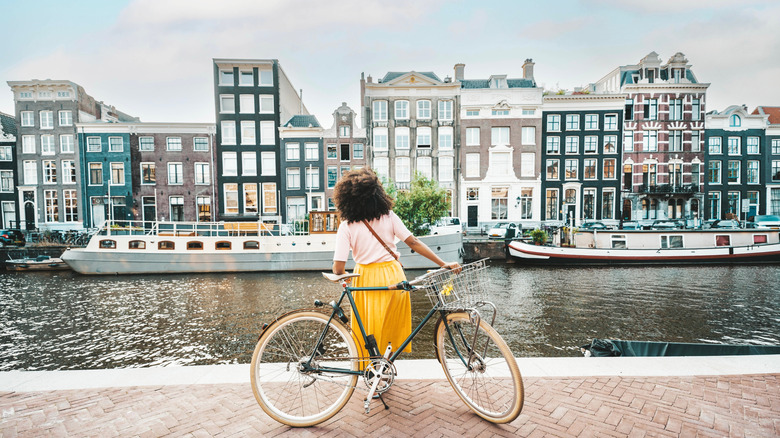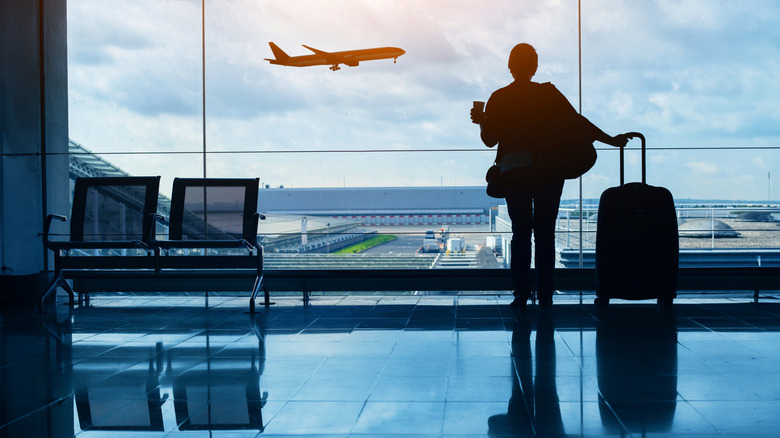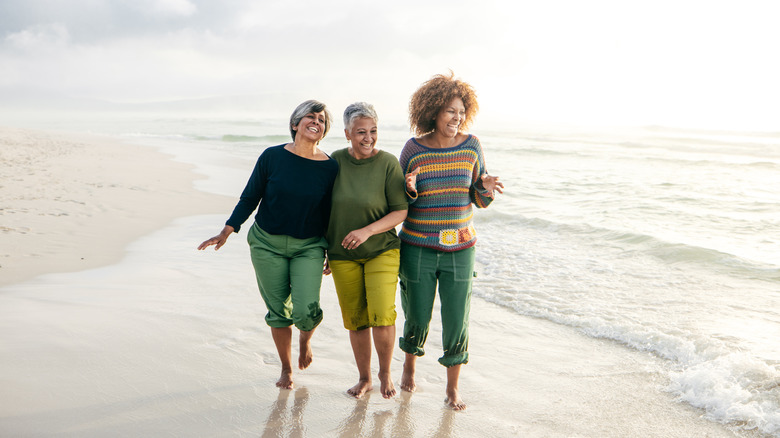The Unexpected Travel Style Married Women Say Is Actually Helping Their Relationship
If you picture your typical female solo traveler, you're likely seeing a twenty-something-year-old with windswept hair and a $10 daily budget, wandering the sun-soaked beaches of Goa, India's pocket-sized tropical paradise. Or perhaps she has her backpack tightly cinched around her waist as she traipses through Europe and sleeps in grungy youth hostels. While this demographic certainly still exists, trends have undergone a surprising shift in recent years. According to a 2023 study by Road Scholar, 60% of solo travelers surveyed were actually married women — and that number was around 40% for the tour operator Sisterhood Travels. Other studies found that, regardless of relationship status, women increasingly want to travel alone (via Travel + Leisure).
So, for those who've decided to forego the romantic vacay and replace it with a getaway for one, this begs the question: Are these marriages in such jeopardy that the couples can't even stand to vacation together anymore? The answer, in most cases, is no. While there are myriad reasons why anyone chooses to travel independently, many married women feel that it helps their relationships. Psychologists also confirm that spending time apart can be healthy, as it gives individuals the chance to focus on their own interests and needs.
But keep in mind that going solo doesn't necessarily mean you're alone. In fact, several niche tour operators have popped up recently to meet the needs of this growing demographic. For example, The Women's Travel Group, which has been operating since 1992, runs high-end, luxurious small-group tours. And the Solo Female Traveler Network creates experiences for adventurous women seeking deep connections and immersion in new cultures. So, whether you choose to book a curated trip or go it alone, traveling on your own may have long-lasting benefits for you and your marriage.
Why married women travel solo
One obvious reason why a couple would choose to holiday separately is logistics: You can't take the same amount of time off from work, you have different vacation schedules, or you're caring for dependents, such as pets, children, or elderly parents, with one person always needed at home.
Another reason is that some couples have diverse interests and travel styles. A vacation can often be the very cause of stress and arguments, especially when things don't go according to plan or if you have different methods for dealing with hiccups along the way. Maybe you're more relaxed when you find out your plane has been delayed for five hours, while this causes your partner a great deal of panic and anxiety. Or perhaps you have differing ideas for how to spend your time abroad and just don't enjoy the same activities. Let's say you love wandering through quirky shopping districts, taking in local fashion trends, and hunting for vintage finds. Meanwhile, your partner finds this mind-numbingly boring, and all they want to do is watch the game at a local pub. This could end with a spat or with one person compromising on their desires and being unhappy.
Finally, solo travel is often about self-discovery. This is a time when you can connect with others outside of your partnership, meeting locals and potentially new friends. It's also a time to develop your own interests and skills. You may take a trip to focus on photography, surfing, writing, or another activity that brings you — but not your spouse! — a lot of joy. As one Redditor explained on the r/femaletravels thread, "solo travel isn't about relationship status for me. It's about adventure, reflection, and independence. And quite honestly, it's my version of self-care."
Planning your solo trip
You might be applauding the courage of solo-adventurers while still feeling intimidated by the prospect. You're thinking, "What should I do when I feel lonely? What if there's an emergency and I'm by myself?" These fears are perfectly normal and are just part and parcel of travel, which is all about pushing yourself out of your comfort zone. But actor Tracee Ellis Ross has a genius tip to easily find out if you'd enjoy a solo vacation: Take yourself out to dinner. And if sitting alone at a restaurant isn't as terrifying as you imagined, you may be ready to go!
If it's your first time traveling alone, an experience curated by one of the aforementioned female-oriented tour operators might be your best bet. You could be celebrating Holi in India or sleeping in gers in Mongolia while sharing meals and laughs with new friends. Alternatively, book a conference, workshop, or creative program that intentionally brings together like-minded individuals for more purposeful travel.
If you'd rather plan a trip on your own, aim for countries that are known for being safe for women and convenient for solo travelers, such as Iceland, Japan, and New Zealand. Many European cities, with their excellent public transportation and good infrastructure, also make great first-time destinations. Upon doing research, you may discover that a lot of places are surprisingly ideal for single travelers. Even stereotypically romantic spots are worth exploring sans partner — like Paris, a top-ranked destination for stress-free solo travel. Some people swear by visiting a Disney park solo as well and claim it's actually better, as you have more independence and much shorter lines. One important thing to remember, though: However you choose to travel, embrace the process — and all the fear, self-doubt, excitement, and joy that comes with it.


